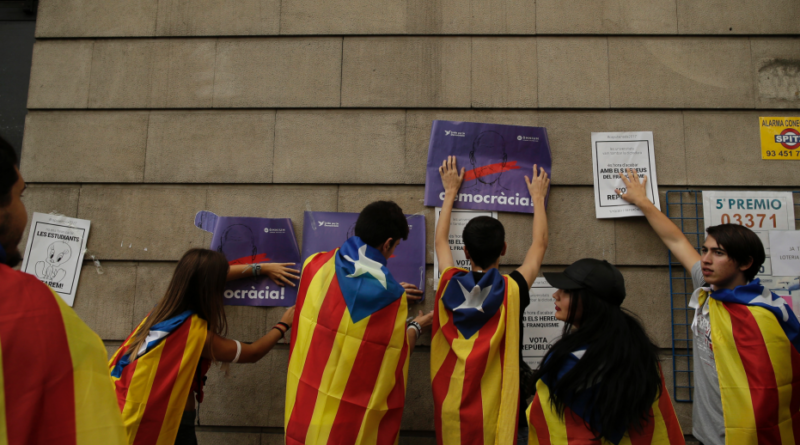Why does Catalonia want independence from Spain?
The history of Catalonia
Catalonia was an independent region of the Iberian Peninsula – modern day Spain and Portugal – with its own language, laws and customs.
In 1150, the marriage of Petronilia, Queen of Aragon and Ramon Berenguer IV, Count of Barcelona formed a dynasty leaving their son to inherit all territories concerning the region of Aragon and Catalonia.
This lasted until the reign of King Philip V. The War of the Spanish Succession ended with the defeat of Valencia in 1707, of Catalonia in 1714, and finally with the last of the islands in 1715 – resulting in the birth of modern-day Spain.
Subsequent kings tried to impose the Spanish language and laws on the region, but they abandoned their attempts in 1931 and restored the Generalitat (the national Catalan government).
General Francisco Franco, however, set out to destroy Catalan separatism and with his victory at the Battle of Ebro in 1938 he took control of the region, killing 3,500 people and forcing many more into exile.
The region was granted a degree of autonomy once more in 1977, when democracy returned to the country.
Calls for complete independence grew steadily until July 2010, when the Constitutional Court in Madrid overruled part of the 2006 autonomy statute, stating that there is no legal basis for recognising Catalonia as a nation within Spain.
The economic crisis in Spain has only served to magnify calls for Catalan independence – as the wealthy Barcelona region is seen as propping up the poorer rest of Spain.
The region’s politics
The conservative Popular Party of Mariano Rajoy, the Spanish prime minister, is only the fifth-largest party in Catalonia, and is strongly opposed to any moves for independence for the region.
The president of Catalonia, Carles Puigdemont, is backed by a coalition of Catalan nationalist forces from the conservative CDC and the leftist Esquerra Republicana de Catalunya (ERC) parties, which, together with the radical Left-wing CUP party, command a majority in the region’s parliament.
In September 2017, this majority approved the holding of a binding referendum on independence for Catalonia, but Spain’s constitutional court suspended the process.
The Catalan authorities went through with the vote, leading to violence inside and around polling stations as Spanish security forces seized ballot boxes and attempted to close down the vote. They said that 2.26 million votes had been counted, with 90 per cent in favour of independence.
Mr Puigdemont says the result is a mandate for a unilateral declaration of independence, although he says he would prefer to negotiate the terms of secession from Spain with the government in Madrid.
How does their economy affect the issue?
The Catalan region has long been the industrial heartland of Spain – first for its maritime power and trade in goods such as textiles, but recently for finance, services and hi-tech companies.
It is one of the wealthiest regions of Spain – it accounts for 19 per cent of Spain’s GDP, equal with the Madrid region. Madrid, however, has a higher per capita GDP, as do the Basque Country and Navarre regions buy cialis black 80mg canada.
Secession would therefore cost Spain almost 20 per cent of its economic output, and trigger a row about how Catalonia would return 52.5 billion euros of debt it owes to the country’s central administration.
It would have a gross domestic product of $314 billion (£195bn), according to calculations by the OECD, which would make it the 34th largest economy in the world. That would make it bigger than Portugal or Hong Kong.
Its GDP per capita would be $35,000, which would make it wealthier than South Korea, Israel or Italy.
And Catalonia’s contribution to the Spanish economy is twice that of Scotland’s to the UK.
In numbers | Catalonia
- 7.5m: The population of Catalonia makes up 16.1pc of Spain’s 46.6 million
- 95 per cent: Proportion of the population that understand Catalan, the region’s primary language. An estimated 10 million speak Catalan worldwide – primarily in Catalonia, the Valencian Community, the Balearic Islands and France
- 9th: Catalan’s ranking on the list of the most widely spoken languages in Europe. It is not, however, on the EU’s list of 24 official languages
- €209bn: Catalonia’s GDP in 2014. Spain’s was €1 trillion
- €65.1bn: Catalonia’s annual exports to other countries (double that of any other Spanish region)
- 13.2 per cent Catalonia unemployment rate in June 2017 is below the national average of 17.2 per cent
- 8 per cent: The amount of GDP the Catalan Government has said it would claw back if it didn’t have to hand over its taxes to the Spanish Government
- 3 notable Catalans: Salvador Dalí, Antoni Gaudí and Montserrat Caballé
This article was originally published by the Telegraph of London

